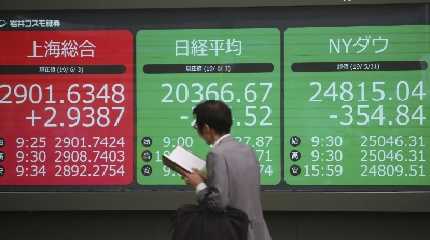
BANGKOK (AP) — Global shares were mixed Monday, with European stocks mostly lower after a day of gains in Asia.
Paris, Frankfurt, Tokyo and Hong Kong rose. London was little changed. Shanghai was closed for a holiday.
Oil prices advanced while U.S. futures slipped.
Ukraine’s President Volodymyr Zelenskyy said the country will include international investigators in a probe into alleged atrocities against civilians by Russian troops. Ukraine reported the bodies of at least 410 civilians were found in areas outside the capital Kyiv after Russian troops pulled out last week.
The European Union’s foreign policy chief, Josep Borrell, joined a growing chorus of international criticism of the alleged atrocities, saying the 27-country bloc “will advance, as a matter of urgency, work on further sanctions against Russia.”
Additional sanctions could impact energy and other markets, adding to uncertainties.
Germany’s DAX lost 0.7% to 14,344.48 and the CAC 40 in Paris declined 0.6% to 6,646.42. Britain’s FTSE 100 edged 0.2% higher to 7,552.03. On Wall Street, the future for the S&P 500 lost 0.1% while that for the Dow industrials shed 0.2%.
On Friday, the S&P 500 rose 0.3% while the Dow Jones Industrial Average added 0.4%. The Nasdaq composite rose 0.3% and the Russell 2000 of small caps gained 1%.
Shares in Hong Kong-traded Chinese companies surged Monday after regulators in Beijing said they plan to revise rules regarding access of overseas regulators to full audits of companies that have shares listed in overseas markets.
The Chinese financial magazine Caixin reported that China proposed the revisions of rules restricting sharing of financial data of offshore-traded companies to help resolving a longstanding dispute with the U.S. that could result in more than 200 Chinese stocks being kicked off American exchanges. It would remove a requirement that on-site inspections of overseas-traded Chinese companies mainly be conducted by Chinese regulators, Caixin said.
“Signs of a potential compromise to keep Chinese stocks listed in the U.S. may aid to relieve some of the delisting fears, which is one of the factors weighing on Chinese equities” in the past year, Jun Rong Yeap of IG said in a commentary.
Shares in video platform BiliBili soared 10.5% in pre-market trading. Meituan’s shares gained 7.4%, search engine Baidu jumped 7.8% and e-commerce JD.com surged 5.7%.
Hong Kong’s Hang Seng index climbed 2.1% to 22,502.31 after Chief Executive Carrie Lam said she would not seek a second term as the territory’s top official.
Lam’s five-year tenure has been marked by huge protests, a security crackdown and an overwhelming COVID-19 wave. Her successor will be picked in May and the city’s security chief during the 2019 protests is among the possible choices
In Tokyo, the Nikkei 225 gained 0.3% to 27,736.47. The Kospi in Seoul rose 0.7%, to 2,757.90. Sydney’s S&P/ASX 200 gained 0.3% to 7,513.70, while India’s Sensex jumped 1.9% to 60,411.20.
Wall Street benchmarks rose Friday after healthy report Friday on the U.S. jobs market eased worries over the recovery from the pandemic, though it also reinforced the likelihood of more interest rate hikes.
Stronger employment may give the Federal Reserve more leeway to raise interest rates to beat down price increases sweeping the country. The Fed has already raised its key overnight rate once, the first such increase since 2018. Following Friday’s jobs report, traders increased bets that the Fed will raise rates at its next meeting by double the usual amount.
The Fed is due to release minutes from its last meeting on Wednesday.
Oil and gas prices have been rising as demand recovers from the depths of the COVID-19 pandemic. The invasion of Ukraine by Russia, a major oil and gas producer, has raised the risk that sanctions and export restrictions might crimp supplies.
A barrel of U.S. crude oil gained 67 cents to $99.94 a barrel in electronic trading on the New York Mercantile Exchange on Monday. It dipped 1% on Friday to $99.27. Early last month, when disruptions to crude supplies were at their height, it briefly touched $130.
Brent crude, the international standard for pricing, picked up 52 cents to $104.91 per barrel.
In currency dealings, the dollar was unchanged at 122.61 Japanese yen. The euro fell to $1.1027 from $1.1042.




